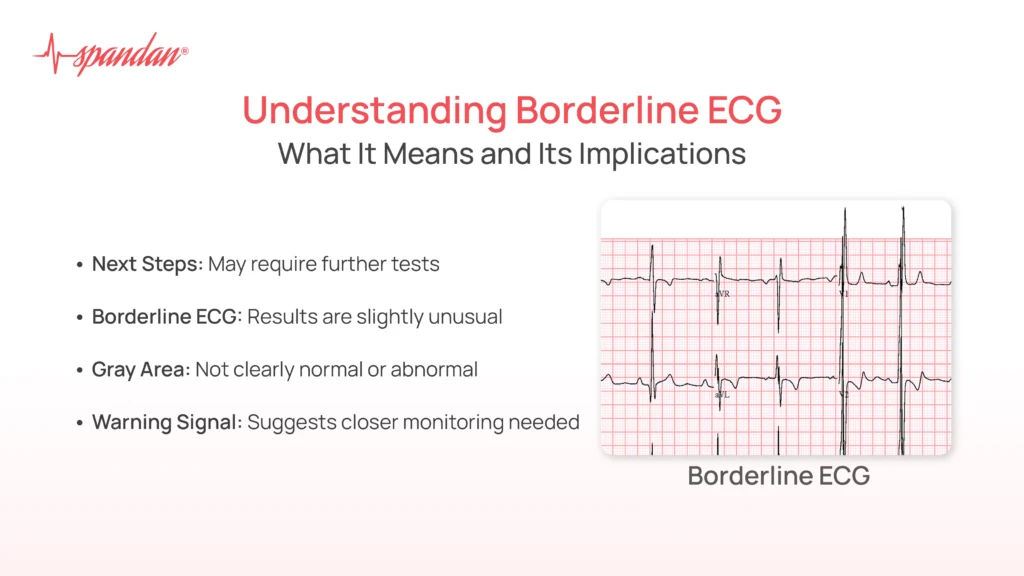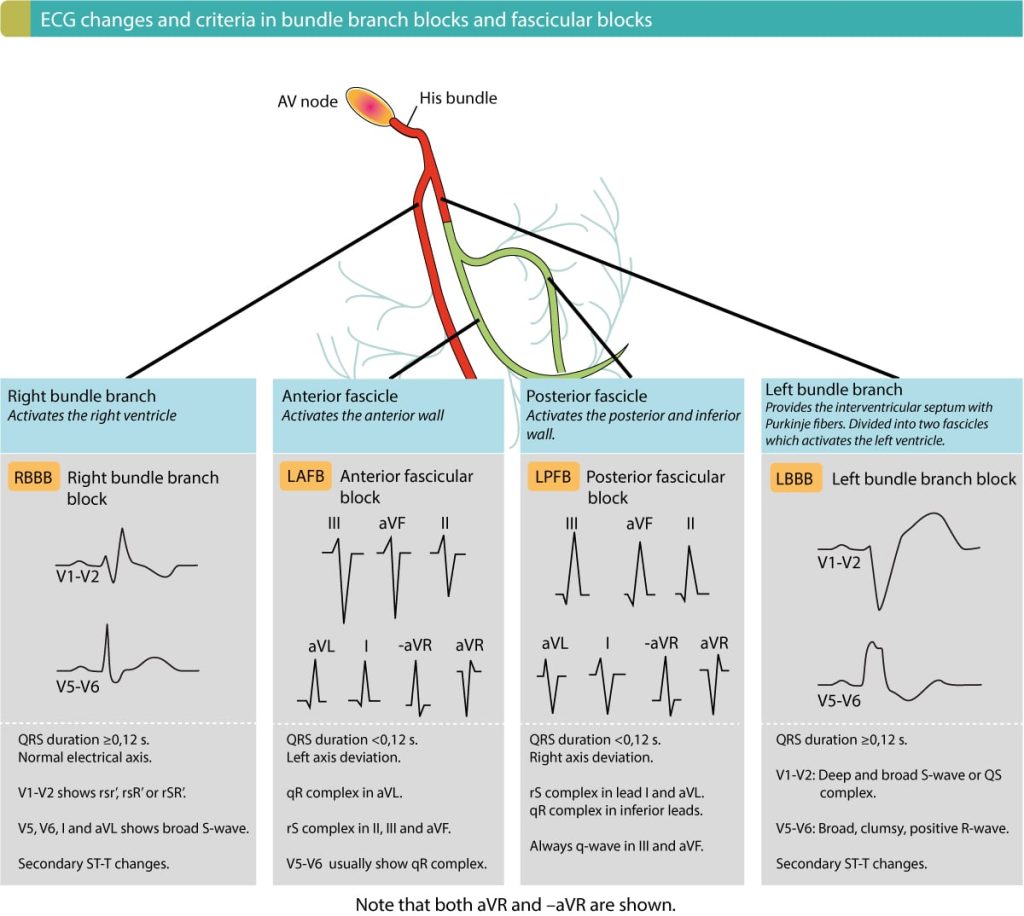What Does ECG Borderline Mean? Understanding The Heart's Silent Signals
Have you ever received an ECG result labeled as "borderline" and wondered what it means? ECG borderline means your heart’s electrical activity isn’t quite normal but not entirely abnormal either. It’s like being in that awkward middle zone where doctors say, "Hmm, we need to take a closer look." If this sounds familiar, you’re not alone. Thousands of people every year get this result, and it can be confusing. But don’t worry—we’re here to break it down for you in simple terms so you can understand what’s happening with your ticker.
Think of an ECG (electrocardiogram) as a snapshot of your heart’s electrical activity. It’s a test that measures how well your heart is functioning by detecting electrical signals. When the results come back as borderline, it means there are some irregularities, but they’re not severe enough to label them as fully abnormal. This can happen for various reasons, and it’s essential to dig deeper into what those reasons might be.
Now, before we dive into the nitty-gritty, let’s address the elephant in the room: Does ECG borderline mean something serious? Not necessarily. It could indicate minor issues that are easily manageable or even harmless variations in your heart’s rhythm. The key is to understand what’s going on and work closely with your healthcare provider to determine the next steps.
Read also:Alana Cho Erime The Rising Star In The Spotlight
What Exactly Is an ECG?
An ECG, short for electrocardiogram, is a diagnostic tool used to evaluate the electrical activity of your heart. It records the timing and strength of electrical signals as your heart beats, producing a graph that doctors analyze for any abnormalities. This test is non-invasive, painless, and quick, making it one of the most common methods for assessing heart health.
When you undergo an ECG, electrodes are placed on your chest, arms, and legs to measure the electrical impulses traveling through your heart. The machine then generates a report showing patterns like P waves, QRS complexes, and T waves. These patterns help doctors identify whether your heart is functioning properly or if there are any issues to investigate further.
So, why is an ECG important? It can detect a wide range of heart conditions, from arrhythmias to heart attacks. However, sometimes the results aren’t black and white, which brings us to our next point—ECG borderline means.
Why Do Some ECG Results Show as Borderline?
ECG borderline means that your test results show slight deviations from the norm, but they’re not severe enough to be classified as abnormal. Think of it as a gray area where the readings are close to normal but not quite there. This can happen due to several factors, including:
- Age-related changes in heart function
- Muscle mass variations
- Electrolyte imbalances
- Medication side effects
- Stress or anxiety during the test
For example, if you have a high muscle mass, your ECG might show slight variations because the electrical signals have to travel through more tissue. Similarly, certain medications, like beta-blockers, can alter your heart’s rhythm and lead to borderline results.
How Common Are ECG Borderline Results?
You might be surprised to learn that ECG borderline results are more common than you think. Studies show that up to 15% of people who undergo an ECG may receive borderline readings. This doesn’t automatically mean something is wrong—it just means your heart’s electrical activity is slightly different from the average.
Read also:Adriana Oliveraz Nudes A Candid Look At The Controversy And Beyond
According to research published in the Journal of Cardiovascular Medicine, borderline ECG results are often seen in younger individuals with no history of heart disease. In many cases, these variations are benign and don’t require further intervention. However, it’s crucial to follow up with your doctor to rule out any underlying conditions.
Who Is More Likely to Have Borderline ECG Results?
Certain groups of people are more prone to receiving borderline ECG results. These include:
- Athletes or individuals with high muscle mass
- People taking medications that affect heart rhythm
- Individuals with electrolyte imbalances
- Those experiencing stress or anxiety during the test
If you fall into any of these categories, don’t panic. Borderline ECG results aren’t always a cause for concern, but they do warrant further investigation to ensure everything is okay.
What Could Borderline ECG Results Indicate?
Borderline ECG means there might be minor irregularities in your heart’s electrical activity. These could indicate various conditions, such as:
- Mild arrhythmias
- Early signs of heart disease
- Electrolyte imbalances
- Medication side effects
Let’s take a closer look at each of these possibilities:
Mild Arrhythmias
Arrhythmias refer to irregular heartbeats, which can range from harmless to serious. Borderline ECG results might suggest mild arrhythmias, such as premature ventricular contractions (PVCs) or atrial fibrillation. While these conditions aren’t always dangerous, they can cause symptoms like palpitations, dizziness, or shortness of breath.
Early Signs of Heart Disease
In some cases, borderline ECG results could indicate early signs of heart disease. This might include conditions like coronary artery disease or hypertrophic cardiomyopathy. If you have risk factors like high blood pressure, high cholesterol, or a family history of heart disease, your doctor might recommend further testing to rule out these possibilities.
Electrolyte Imbalances
Electrolytes like potassium, sodium, and calcium play a crucial role in maintaining proper heart function. Imbalances in these minerals can affect your heart’s electrical activity, leading to borderline ECG results. Simple blood tests can help identify and correct these imbalances.
Medication Side Effects
Certain medications, such as beta-blockers, calcium channel blockers, and antiarrhythmics, can alter your heart’s rhythm and lead to borderline ECG results. If you’re taking any of these medications, discuss your results with your doctor to determine if adjustments are needed.
What Should You Do If Your ECG Is Borderline?
Receiving a borderline ECG result can be unsettling, but it’s important to stay calm and follow up with your healthcare provider. Here’s what you should do:
- Schedule a follow-up appointment with your doctor
- Discuss your symptoms and medical history
- Consider additional testing, such as a Holter monitor or stress test
- Make lifestyle changes if recommended by your doctor
Your doctor might also suggest repeating the ECG after a few weeks to see if the results have changed. This can help determine whether the borderline readings were a one-time occurrence or part of a larger pattern.
Can Lifestyle Changes Improve Borderline ECG Results?
Absolutely! In many cases, making simple lifestyle changes can improve borderline ECG results. Here are some tips to consider:
- Maintain a healthy diet rich in fruits, vegetables, and whole grains
- Exercise regularly to strengthen your heart and improve circulation
- Avoid smoking and excessive alcohol consumption
- Manage stress through techniques like meditation or yoga
- Stay hydrated and maintain proper electrolyte balance
By adopting these habits, you can support your heart health and potentially improve your ECG results over time.
When Should You Be Concerned About Borderline ECG Results?
While borderline ECG results aren’t always a cause for concern, there are certain red flags to watch out for. If you experience symptoms like chest pain, shortness of breath, dizziness, or fainting, it’s important to seek medical attention immediately. These could indicate a more serious underlying condition that requires prompt evaluation and treatment.
In addition, if you have risk factors for heart disease, such as high blood pressure, diabetes, or a family history of heart problems, you should take borderline ECG results seriously and work closely with your doctor to monitor your heart health.
Conclusion: What Does ECG Borderline Mean for You?
ECG borderline means your heart’s electrical activity is slightly different from the norm, but it doesn’t necessarily indicate a serious problem. By understanding what borderline ECG results mean and working closely with your healthcare provider, you can ensure your heart stays healthy and strong.
So, what’s the next step? If you’ve received a borderline ECG result, don’t hesitate to follow up with your doctor. They can help you determine whether further testing or lifestyle changes are needed. Remember, knowledge is power, and staying informed about your heart health is the best way to protect yourself in the long run.
Got questions or concerns? Leave a comment below or share this article with someone who might find it helpful. Together, let’s keep our hearts beating strong!
Table of Contents
- What Exactly Is an ECG?
- Why Do Some ECG Results Show as Borderline?
- How Common Are ECG Borderline Results?
- What Could Borderline ECG Results Indicate?
- Mild Arrhythmias
- Early Signs of Heart Disease
- Electrolyte Imbalances
- Medication Side Effects
- What Should You Do If Your ECG Is Borderline?
- Can Lifestyle Changes Improve Borderline ECG Results?
- When Should You Be Concerned About Borderline ECG Results?
Article Recommendations


